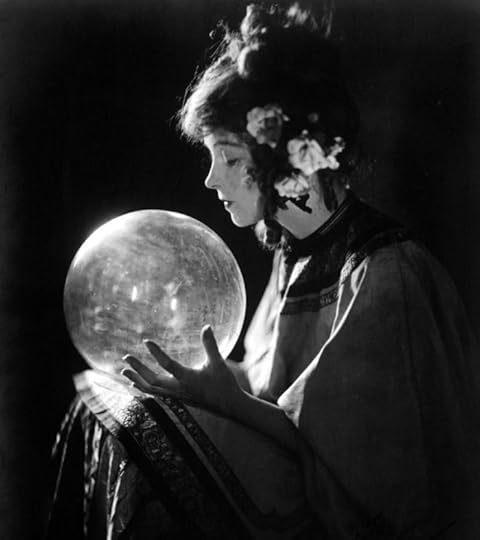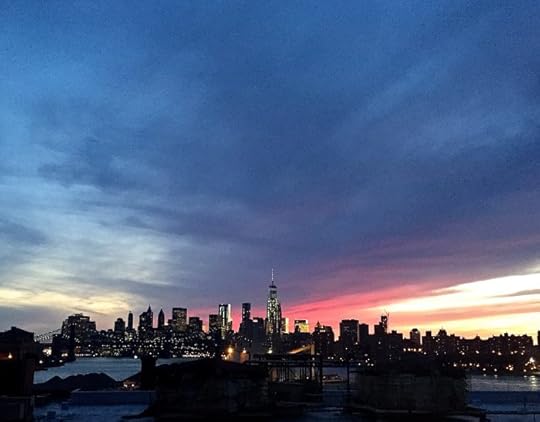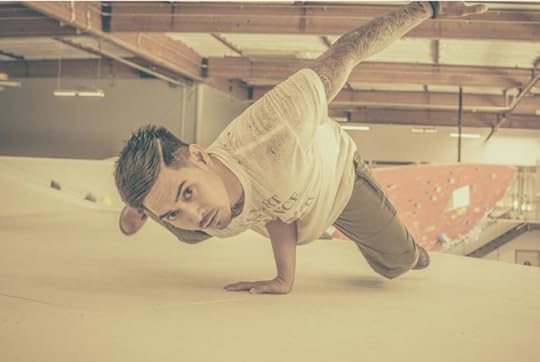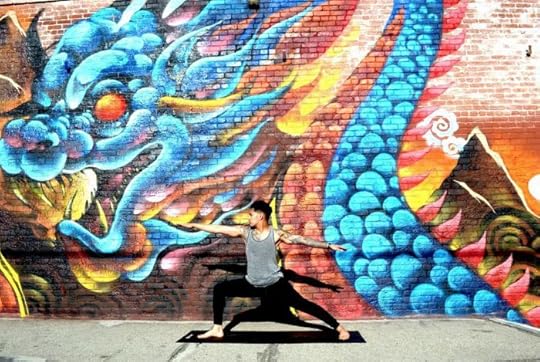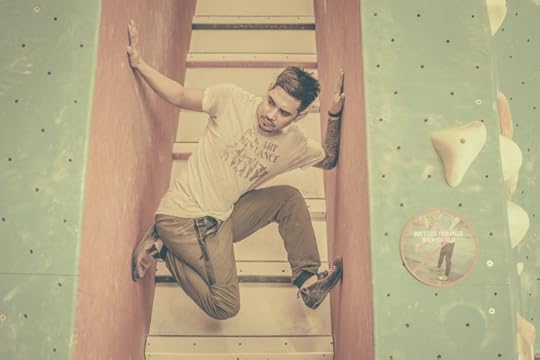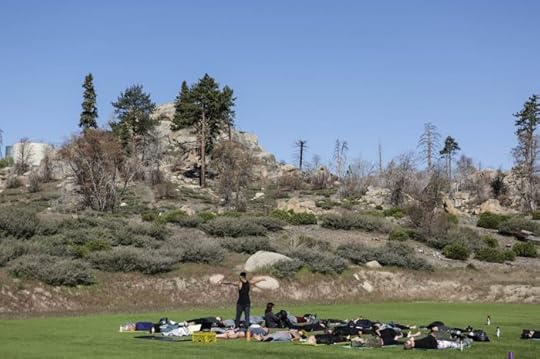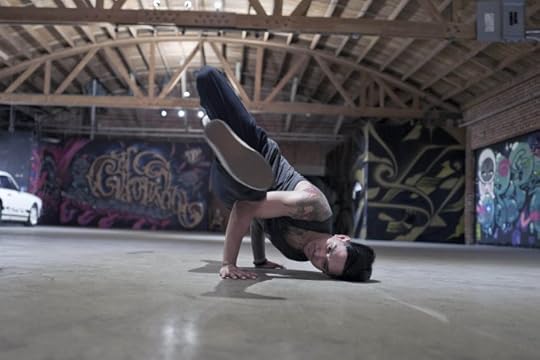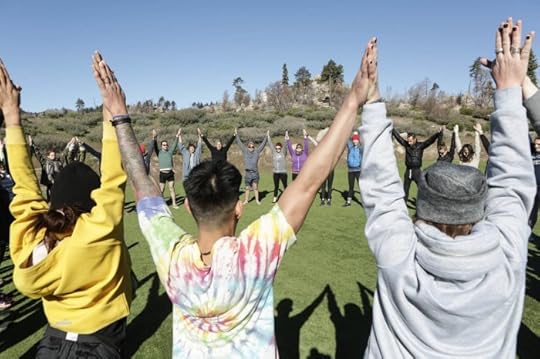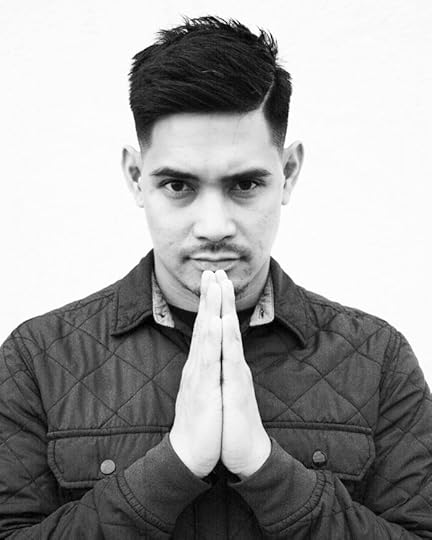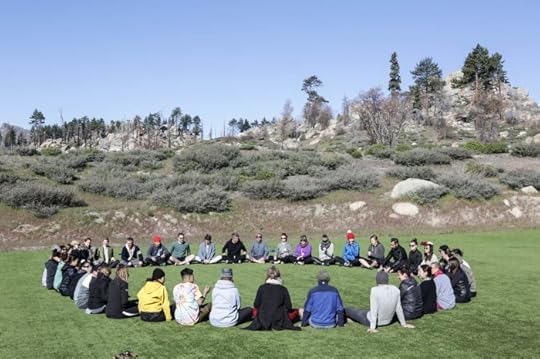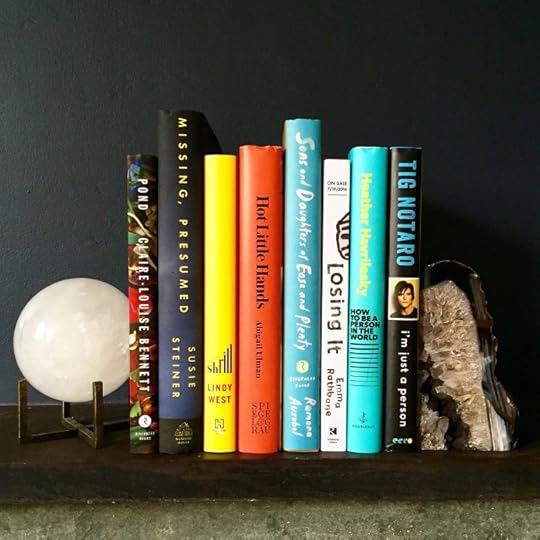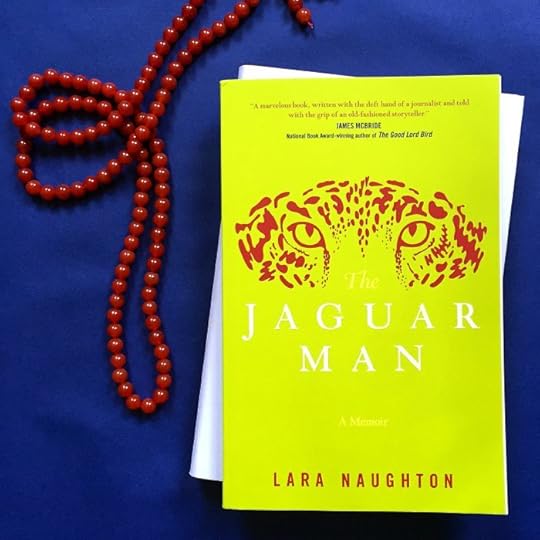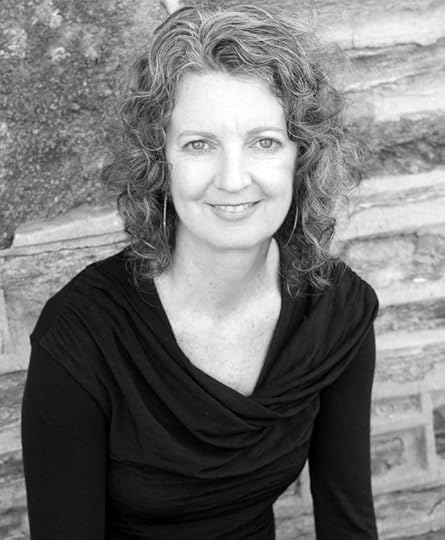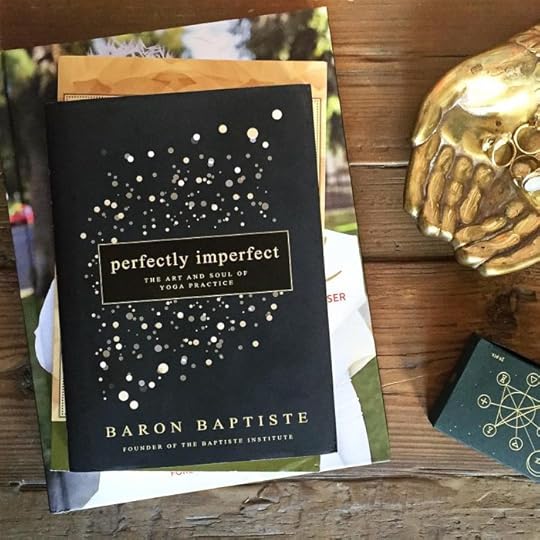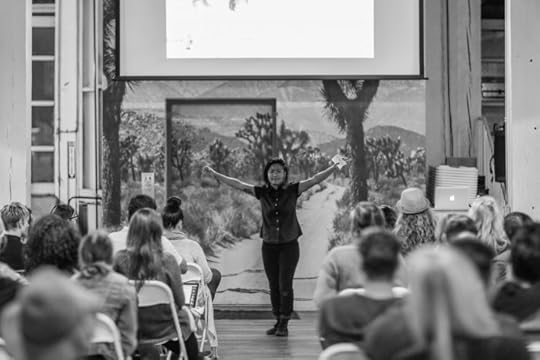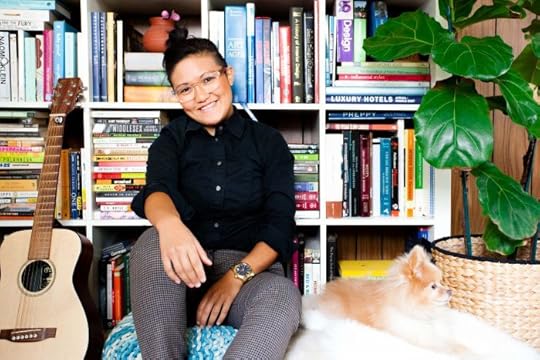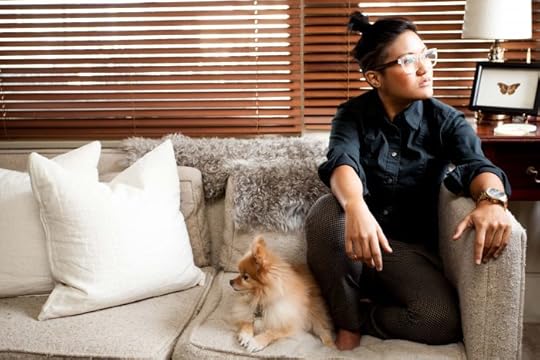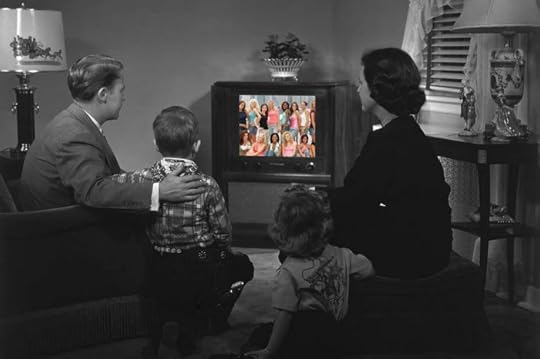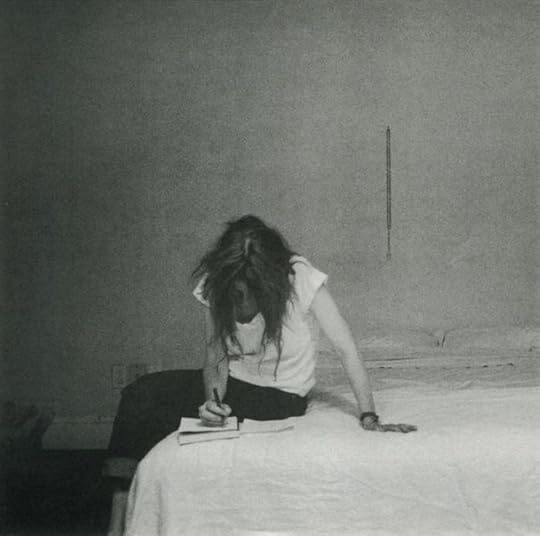Caroline Cala's Blog
February 23, 2017
Bolstered by the Mantis
What follows is technically a work of fiction. But I suppose it bears mentioning that sometimes fiction lets us cut a little closer to the truth.
***
Show up. Be nice. Wear the magic black tank that flatters in all the right ways.
You are bored or indifferent. You are anxious or grumpy or tired. Google your date in the cab on the way, where you learn he has two children. He has yet to mention them. Wonder how, if ever, they will come up.
Show up. Be nice. Greet a person who in no way resembles his photos. Resist the urge to bolt because Buddha probably wouldn’t.
Drink past friendly and straight into weird. Hope your grin looks sincere and not like an aggressive badger. Three vodkas deep, your date’s eyes morph into one cycloptic orb, which is kind of a relief, because now you don’t have to choose which one to focus on. Eye contact can be tricky.
Show up. Be nice. Same old black tank, same stories with the well-practiced punch lines. But this time, it is different.
You smile without effort. You laugh for no reason at all. Spend an easy eight hours together. Blink and there goes a workday, an entire night’s worth of slumber. You are seen, heard, counted. You feel like you, which is a feeling you’d forgotten.
Picture your spawn. Map his natal chart. Call all your friends and even a few blood relatives. Cross your fingers and knock on wood, but know in your heart there’s no need for superstition. This has wings, which means you do, too.
Exist, for a heartbeat, in that magical place before attachment. Maybe two weeks, three weeks, four. One night, as you’re falling asleep, he breathes into your hair and whispers that he loves you. He isn’t quite conscious, but still, this must count. Wonder how you ever got so lucky.
“For the first time,” you tell a friend, “Everything feels like an answer instead of a question.”
And then, so slowly you almost don’t notice, start to feel bad. Grow restless or suspicious or defensive. Read into pauses and in between lines. Respond to every doubt with three decades’ worth of anger. An ally would surely understand. You know it isn’t fair, but then again, neither is anything.
Doubt your shape, your status, your sense of humor. Feel those wings that you grew start to shed. There you are, taking screenshots of inspirational quotes. There you are, checking your horoscope again, like somehow it might change.
Take a little longer than you should to respond. Attempt to reclaim power you’re not sure you had.
In your spare time, read a book about animal mating habits. You are bolstered by the mantis and its head-biting ways. You remember the lobster. You ponder the wolf. You look in the mirror and you’re still a person.
At a party, a friend describes you as “good at relationships.” Make a mental note to take up a hobby. Serial monogamy has granted you nothing. Knitting, at least, would yield hats.
The very next day finds you watching him leave. He forgets only his hat. Irony, you think, is phenomenally irritating.
“Sounds like you dodged a bullet,” says everyone, which proves how little your own friends know you. What you wanted was to get shot.
You are haunted by a lot of things, but this one the most: You didn’t know, the last time you kissed, that it would be the last.
You are left with songs, with nicknames, with memories ripe for dissection. There are movies you will boycott. Streets you will avoid.
“Why didn’t we…?” You wonder aloud, to a room full of no one. Fill in the blank a thousand ways. You cannot distinguish between truth and myth. Perhaps it’s for the best.
In your youth, you forgave everything. Wish you could remember how.
Show up. Be nice. Grab your coat; the seasons have changed.
September 26, 2016
The Last Laugh
Lately, I’ve been forced to grapple with the fact that getting what you want can be terrifying. For years, I called it a fear of failure. Only recently did I discover it’s very much the opposite.
What if it all works out?
Before you can get what you want, it helps to know what you want. This is a challenge all its own. But I’ve found the world has a way of leading you there just the same.
Case in point: here are eight very short, entirely true stories illustrating how I’ve been wrong about pretty much everything…
PART ONE: HEAD
1998
“Can you stay for a moment after class?”
For once, I haven’t been overly chatty, nor was I writing a note to, from, or about a boy. What is this about?
“I want to ask you something,” says my eighth grade English teacher, appraising me with a tenderness not rivaled by any human before or since. “Have you ever thought about becoming a writer?”
“That’s not a job,” I say.
2000
My boyfriend is tall and blond and vaguely resembles Jared Leto. We have nothing in common. In the universe I inhabit (a place where “sparkles” is a color and “fructose” is a food group) we will be together forever, and his college applications are of the utmost importance.
“I want to go to school in New York City,” he announces (mere months before he’ll end up in a pasture).
“That’s FINE if you want to go there,” I spit. “But I HATE New York. I mean, I probably won’t even come visit you. That’s how much I hate it.”
2004
My college history paper is bleeding. The word count is rivaled by the number of red-penned comments cluttering the margins.
“Too journalistic!”
“Very funny, but not appropriate.”
“Highly entertaining! Not sufficiently academic.”
It is the worst grade I’ve ever gotten.
Moments later, it meets its fate in a shredded heap at the bottom of my wastebasket. “Why am I so droll?” I wonder, for longer than is useful. “I should really tone that down.”
2007
“You guys, I think this could be the one.”
2009
“No, but really, this time I mean it.”
2012
“I KNOW I’ve said it before, but this is actually different than anything I’ve ever experienced. It’s like, I’ve never felt so seen. You know?”
2016
I am in need of a dress, to wear to everyone else’s weddings. I find one, track it down at a small boutique, ask for the style by name.
They’re currently sold out in black, I am told, but they do have one in white. Would I like to try it on for size?
The dress and I are left alone in a changing room. It is, for all intents and purposes, a wedding dress — a much different beast than a dress for weddings. Against my better judgment, I put it on my body. I want to burn it immediately. I want to never take it off.
A head bursts through the dressing room curtains.
“Oh my god!” exclaims the sales clerk, clapping his hands. “Are you getting married?!”
“No,” I say, a little louder than necessary.
Last month
“You should try dating again,” says every friend always, but one more emphatically than the others.
“No.”
“It will be fun!”
“No.”
“You always say that, but then you’re glad when you do!”
“No. I’m tired. And I never like anyone.”
“I’m willing to make a bet. In one month, you’ll be madly in love with someone wonderful, and we’ll look back at this moment and marvel at how you almost didn’t let that happen.”
I cross my arms. “That is utterly impossible.”
***
PART TWO: HEART
Perpetuity
Hahahahahahahahahahahahahahahahahahahaha. Ha.
(Photo of Lillian Gish, early 1920s)
July 27, 2016
A Love Letter, Long Overdue
New York and I are coming up on our fourteen-year anniversary. As with all relationships, there are moments where I’m entrenched in the depths of my love, and many more where I take it for granted. Still others find me wishing I could run away, concocting elaborate fantasies of a better life. (“Trees! Mountains! A washer/dryer!”) Every time, I stop and ask, where else would I go? I have yet to find the answer.
In honor of another year together, here are eight things New York has taught me…
We’re all small fish in a big pond.
Like many of my generation, I am a special snowflake. I arrived on this island wanting to leave an indelible mark. But living here can feel a lot like this photo of Earth from 4 billion miles away. The perspective knocks the wind from you, until it sets you free. “HEY!” shouts the city, from inside the shimmer of a thousand tiny windows. “I think we may have met before, but what’s your name again?” You are not — could never be — the central focus. You are always alone in a crowd. “On any person who desires such queer prizes, New York will bestow the gift of loneliness and the gift of privacy,” wrote E.B. White. And they are gifts indeed.
Someone is having a worse day than you.
To walk a mile in New York is to witness someone’s suffering. The person who asks you for change. The person who shoves you while boarding the 6 train. The neighbors whose nightly bickering passes through your living room wall. The city is a place of sweeping, alternating perspectives, constantly challenging where you fit in. Then one craptastic day, it’s your turn. You get heckled or injured or mugged. You lose someone you love. You are splashed by the classic meeting of bike tire and mud puddle. Whatever happens, you will survive. In its own sly way, New York has taught you how to do this all along.
Someone is having a better life than you.
Long before the filtered curse of social media, taking a walk through the Upper East Side or the West Village or the tree-lined streets of Brooklyn would send me into a tizzy. From the outside, everyone’s life appears incomprehensibly charmed. Screw keeping up with the Joneses when the Joneses are billionaires. Or when you encounter a supermodel buying a pack of sugarless gum at the very same moment you procure an economy-sized sack of Halloween candy (true story). Or the Times Square billboard promoting twelve stories’ worth of abs that are less realistic than the plot of Sharknado 2. New York taught me to say, f*ck the f*cking Joneses. There’s no time for that noise.
No one else knows what they’re doing, either.
Nora Ephron once wrote, “I thought [New York] was going to be the most magical, fraught-with-possibility place; a place where if you really wanted something you might be able to get it; a place where I’d be surrounded by people I was dying to know. And I turned out to be right.” When I came here, I hoped the city’s magic would rub off on me; that proximity to success and knowledge would encourage them to seep right into my being. What surprised me the most is not how wondrous the people are, though that is sometimes the case. Rather, it’s the many times those dazzling individuals have come right out and admitted they had no idea how to do their job, run their business, write that book, be married, raise a child, insert-large-undertaking-of-choice. What they did was start, then take it one day at a time.
Everything is constantly changing.
Buddhism teaches that all things are impermanent, that nothing is forever except change. This fact is quite evident when you live in a place where the skyline morphs on a monthly basis, where scaffolding is built and deconstructed so quickly it can feel like you’re trapped in a stop-motion film. You cannot control the tides. Often, you can’t even control your commute. So you adapt. You learn, however begrudgingly, to bend. You do this even when you’re harried and over-caffeinated and when “mindfulness” sounds suspiciously like something that hails from L.A.
You may glimpse yourself in everyone you meet.
One of my favorite quotes is from Gandhi: “If you don’t see God in the next person you meet, it is a waste of time to look further.” I’ve turned this into a game and practice whenever I can. In the cab, on the subway, with my significant other. It isn’t always easy. But spotting humanity is more plentiful and fulfilling than Pokémon. After years of seeking solace in solitude, it was connection that gave me life.
The answers are already inside you.
The city is not quiet. The city is not still. Yet the city has shown me the wisdom in each. I used to wander through the streets, searching for signs. What was I supposed to do with my life? Should I stay in my relationship? Was I on the right track? I looked everywhere for validation, when it was hiding inside me. In the midst of the noise and haste, I learned to stop talking, to stop thinking, to sit quietly with myself and take stock of what I’m feeling. You may not find it immediately, and it may not be the easy solution, but if you listen closely, I’ve found the answer is always there.
Wonder is a two-way street.
On my first night in New York, I made new friends. I met a boy. I stayed out late. I saw the East Village bathed in moonlight and the skyline looming overhead. It was, up until that point, the most magical night of my life. It felt like everything was possible. Over the next decade, life happened, and my wonder all but died.
Yet on all days — even days like this, when the humidity is stifling, the traffic is loud, and work feels like too much to manage — there is a glimmer that beckons: Come find me. Go for a stroll, hop on the train, but whatever you do, keep your eyes open. Somewhere outside your line of vision, there is Broadway, there’s a flash mob, there is Central Park. There is history in progress. There is one small act of kindness. There is your next great chapter.
After all, this is the city that houses more people than 39 of the 50 states. The place that built the then-highest building at the lowest point of the Great Depression. The city where toilet paper was invented. The home of the first U.S. pizzeria, and eventually, the first pizza rat.
I spent so much time waiting for wonder, so much time staying positive in the hopes it would appear. Until one day it whispered: No, kid, this is a two-way street. Your job is to find me. Your job is simply to notice. And when you do, I will visit you often. We’ve both kept our end of the bargain.
Thank you, New York, for everything.
July 21, 2016
Advice From a Dude Who Made Me Cry
A few weeks back, I went to CAMP, a creative conference held at a California summer camp. Every morning, we’d gather for yoga with Marco Antonio, an instructor with a unique teaching style. (“My voice sounds like Aziz Ansari. It isn’t very zen.”) On our last day, he led an “emo breathing exercise” that made me cry a million tears. Though I tried to pass it off as elevation sickness or severe dehydration or just a hangover from the previous night’s scout dance, in the end, I had to admit, I was moved.
Today, the inimitable Marco shares his thoughts on staying positive, students who give him the stink eye, and why yoga is for everyone…
Do you remember your first experience with yoga? Were you immediately hooked?
Around seven years ago, I tried a Bikram class with a friend. Bikram is a style of hot yoga that can get pretty intense. (I wouldn’t suggest making it your first class!) My friend almost fainted and left halfway. I stayed until the end, but it did NOT hook me immediately. I was like, “You have to hold these poses forever.” But part of me sensed that I was learning something valuable.
Why did you stick with it?
A relationship had just ended and I was really lonely. Yoga became my escape. I wanted to be part of a community, to form new friendships with people on a similar path of trying to help themselves. I was going to therapy at the time, but yoga was what helped me put everything I needed — physical and mental — together in one place.
How has yoga helped you in other areas of your life?
It taught me how to control myself and how to deal with adversity. I have asthma, and before yoga, I didn’t know how to breathe properly. It also helped me gain control over my anxiety through movement and mindfulness. All through my 20s, my mind was always running, and yoga created the space to see where I was pushing too hard and needed to slow down.
How would you describe your teaching style?
I usually refer to myself a gateway teacher, kind of like drugs. I aim to work with people who are scared or intimidated or totally new to yoga, and make it super accessible and hopefully enjoyable.
What’s your advice for finding a class that feels right?
Finding a yoga teacher is almost like dating. Everyone teaches in a very different style — chilled out, intense, athletic, spiritual — and sometimes you have to try a bunch of classes until you find someone whose vibe matches what you’re after. Also, do some research before you go. My favorite teachers are actually people I found on Yelp! If a teacher is really good, people will talk about them.
Speaking of energy, how do you stay so positive?
First off, to be completely honest, I’m not positive all the time. I can be extremely critical of myself. But yoga taught me this: When you pursue what you’re passionate about, you naturally find the space for gratitude. In my experience, if you make time for things you enjoy, the law of attraction comes into effect, and you naturally find yourself feeling more positive.
What’s one lesson you’ve learned from your students?
I’ve been surprised by how much I can relate to a variety of people, from young athletes to senior citizens. When I first started out, my goals were focused on inspiring youth. But I’ve noticed that my senior students are the ones who stay after class and express their gratitude. I’m always afraid someone is going to be like, “Hey son, you don’t know what you’re talking about!” But I love that we can all relate to and inspire one another.
What’s one surprising thing about being a yoga teacher?
A lot goes into a class. You don’t see what happens behind-the-scenes — coming up with a flow, putting together a playlist, breathing exercises, formulating a whole experience for your students. I draw inspiration from everywhere — what I read, what I see, conversations I have with people. I’m always looking for things to bring to class.
Do you ever encounter students who are just not having it?
Yes. The other day, this girl was giving me the stink eye. Another time, a student kept questioning all my instructions, saying things like, “Isn’t your foot supposed to go here?” But the show must go on. You have to go in with the understanding that not everyone likes everything, and that’s okay.
What would you tell someone who finds yoga intimidating or boring?
My master teacher always says, “Yoga is just life.” It’s your practice, and it can be whatever you want. Don’t be afraid to try different things. If you don’t want to do a pose, you don’t have to. If your body isn’t comfortable with something, don’t do it. I don’t start or end my class with the sound of “Om,” because I suck at it, and since I have asthma, my Om lasts three seconds. Also, take it slow. Yoga isn’t like a cardio class where you attack it right from the beginning. Go slowly, and save your energy for the end.
Congrats on becoming a member of Boys of Yoga! What’s the deal with that?
Boys of Yoga is a crew of international yogis working to make yoga more appealing to guys. There are lots of misconceptions out there, from popular culture and the media, that yoga is exclusively feminine. It can be hard to get guys on the mat. I hate to think that anyone believes yoga is limited to any type of person. It’s not just for those who can afford it, or for young people, or for tall, flexible mermaids. Yoga is for everyone.
What’s one piece of advice you live by?
The first thing that comes to mind is actually something I read in a Kanye West book [laughs]. I’m sure he didn’t actually write it, but the line is, “Never complain without offering a solution.” That has helped me so much. If there’s something you’re not happy with, it’s not going to change unless you take action.
***
Thank you, Marco! I’m grateful to call you a friend.
(Photos courtesy of Marco Antonio. Bouldering photos by Michael James Wong via Boys of Yoga. CAMP photos via The Unique Camp.)
July 18, 2016
New Book Alert: July Edition
Is there anything better than summer reading? Maybe. Possibly many things.
Still, slow summer days — book in hand, cold drink nearby, some body of water off in the distance — are one of life’s great pleasures. If you’re looking for your next read, here are eight new books worthy of a spot in your beach/pool/park tote…
Pond by Claire-Louise Bennett
Do you like weird things? Do you enjoy sentences that beg to be savored? If you answered “yes” to either, you may want to check out Pond. Composed of 20 brief sections, Pond features the poetic, stream-of-consciousness observations of a nameless, solitary young woman. Yep, that sounds boring, but it’s good, I swear. From peeling fruit to having sex to writing emails, our anonymous heroine casts a bewitching veil of beauty over the minutiae of everyday life.
Shrill by Lindy West
So. F*cking. Funny. I want to provide 18,000 specific examples to illustrate this point, but I won’t rob you of a single firsthand moment of its funniness. West’s memoir explores being a loud woman in “a culture that demands women be as small, quiet, and compliant as possible — like a porcelain dove that will also have sex with you.” This quote from Jenny Lawson sums it up perfectly: “It made me hurt, both from laughing and crying. Required reading if you are a feminist. Recommended reading if you aren’t.”
How to Be a Person in the World by Heather Havrilesky
If you, like me, can’t get enough of Ask Polly, the New York Magazine advice column full of cursing, tough love, and excellent guidance, then get your paws on this book. From relationships to career to emotions to family, Polly has you covered. This volume of never-before-seen columns, along with a few old favorites, is almost as good as having her on speed dial.
Losing It by Emma Rathbone
26-year-old Julia Greenfield is a virgin. This summer, she’s committed to changing that. Losing It is smart, funny and full of heart — the perfect beach/vacation/when-you-want-something-light-but-not-stupid read. This book will especially appeal to anyone who has ever shouted (out loud or just to themselves), “WILL I EVER FIND MY PERSON??”
Missing, Presumed by Susie Steiner
If mysteries are more your speed, this is the book du jour. Detective Manon Bradshaw, a thirty-nine-year-old woman enduring a disastrous dating life, is suddenly thrust into the center of a puzzling crime. Perfectly paced, beautifully written, and laced with dark humor, Missing, Presumed is more than a twisty crime novel, it’s literary and complex.
I’m Just a Person by Tig Notaro
In 2012, comedian Tig Notaro was hospitalized for a debilitating intestinal disease, her mother unexpectedly died, she went through a breakup, and she was diagnosed with bilateral breast cancer. Tig famously spun this news into comedy gold, as seen in her wonderful namesake documentary. Now, she opens up even more about that harrowing year. Expect to laugh and cry — sometimes all at once.
Hot Little Hands by Abigail Ulman
Over the course of nine loosely connected stories, Hot Little Hands introduces us to four young women navigating the waters of becoming themselves. Is it light? No. Is it good? Yes. With plenty of sex, drinking, and awkwardness, the book has garnered comparisons to HBO’s Girls. With meticulous pacing, realistic dialogue, and plenty of raw emotion, these stories will resonate with anyone who’s ever felt more than a little lost.
Sons and Daughters of Ease and Plenty by Ramona Ausubel
“Sometimes it seems like ALL books are either about regular people trying to be rich, or else rich people losing all their money,” bemoaned one friend, during a recent conversation. And yes, this novel, about a couple that exhausted the family fortune, would technically fit that description. But Ausubel’s writing, infused with humor, whimsy, and subtle magical realism, makes this book stand far, far beyond the rest of the pack.
And, in case you missed it, here are nine more great reads from last month.
What are you reading these days?
July 12, 2016
“We All Have the Opportunity to Reframe Our Own Story”
On the fourth day of a two-week vacation, Lara Naughton’s life took an unexpected turn when she was kidnapped and assaulted by a man pretending to be a cab driver. Unable to escape, she relied on the only defense she had: compassion. It ultimately became the focus of her life’s work.
Today marks the publication of her memoir, The Jaguar Man. I am grateful to Lara for sharing her wisdom on healing, humanity, and one small change we can all make to cultivate more compassion…
How did you go about processing such a complicated experience?
As soon as I got home, I immediately looked to literature, because that’s where I get my guidance. I wanted to make sense of what happened, but I couldn’t find a book about rape that resonated with me. So I sat down and wrote it for myself. Writing was my way of figuring out how to think about the experience, about myself, about the man. It helped me shape and morph a new identity. That was going to happen one way or another, and I wanted to have an active role in it.
Were you surprised by what came up as you were writing?
I was surprised every day. I was surprised when something was difficult, and I was even more surprised when it was fun. Not ferris wheel fun, but fun that I could be the shaper of my own world. Ultimately, I was most surprised by how much I cared about the man. That became the focus of the book, and also the focus of my life. It was one of those instances where a horrendous situation can yield many positive results.
Your compassion for the Jaguar Man originally arose as a survival mechanism. Had you given much thought to compassion before that?
No. I’ve always tried to be kind, but compassion wasn’t something I’d considered in any deliberate way. I didn’t even know how to meditate at the time! But the Jaguar Man talked incessantly; he was so in the midst of his own pain, and he gave me that information to work with. My own personality has always been that of a helper, a teacher. So he allowed me to click in and apply it to this situation. It was only after I got home that I began asking questions about compassion.
Did you look at people differently after your experience?
I did. I started seeing everyone’s levels of pain, and their desire to relieve it. Since that experience, I’m more generous in recognizing that things are not about me. When I have the impulse to take something personally, I step back and say, something else is going on here. There’s an expression in compassion training, “just like me.” When you’re able to start seeing other people as “just like me,” you begin to respond very differently.
Can you tell us about your compassion training course?
The Center for Compassion and Altruism Research and Education (CCARE) is part of the Stanford School of Medicine, founded by a neuroscientist who studies the effects of compassion on the brain. He teamed up with the Dalai Lama — not a bad partner! — and a team of psychologists. Together, they developed an eight-week compassion training course, which I am certified to teach. The class is based on mindfulness meditations, everyday practices, and lots of discussions and questions about compassion in our lives.
So what, exactly, is compassion?
Compassion is a very distinct emotion. It has a clear definition, which is recognizing the suffering in somebody else, wishing for it to be relieved, and having the willingness to help and act. It doesn’t mean you have to help, but it means you are willing.
What’s one way to cultivate more compassion in our lives?
Slow down and pay attention. Ask, “How are you?” and then stop long enough to listen to the answer. So often we ask, and then go along our way, and we have no idea that the other person is in pain. Or we don’t express that we may be suffering in some way. If you just slow down enough to listen, suddenly everything shifts. I see a need in you, and I can be present for that.
How can we feel more compassionate towards people who have wronged us?
The first step is recognizing that the person’s actions came from a place of dis-ease, and it is not personal. Things often feel personal, but they’re rarely about us. There are two ways to think about this: One is to feel compassion for yourself. Does the person still trigger some anger or disappointment or grief? Allow yourself to feel that and work with it. To develop compassion for another, you first must look at yourself. The second way is to consider Mettā, a loving kindness meditation. It goes like this: “May you be happy, may you be free from pain and suffering, may you know peace and joy.” You can direct this thinking towards yourself or anybody. I would also add, not everyone wants to feel compassion for someone who has wronged them. Any person who is harmed has a right to go through any process and have a large range of experiences. I think people come to compassion when they’re ready for it.
Perhaps the hardest question for many of us is, how can we cultivate more compassion for ourselves?
It’s hard work. It’s sitting down and breathing and asking, how am I feeling in this moment? And then doing the best we can to sit with it for as long as we can. If we were as awful to other people as we are to ourselves, we wouldn’t have many friends. The things we say to ourselves can be so cruel. It can be hard to recognize the suffering in ourselves. That’s what mindfulness teaches us, to be present in the moment, so we can notice what we’re feeling.
Your recent essay poses such an important question: Why is rape a women’s issue?
When I returned from my trip, I was so angry to only find information about rape in the women’s section of a bookstore — if I found it at all. I thought, “I’m the victim here, and it’s also my issue?” It did not feel like this was mine to fix. Why is every statistic focused on the women — one in six. Why do we not ask, how many men? There are men walking all around us who have done this, and we’re not talking about them. I think there’s no way we can eradicate or even reduce that number until we get to the source. This is a community issue. If we don’t also look at rape as a men’s issue, they don’t have any resources to turn to, and it perpetuates over and over.
One quote of yours that I’ve reflected on a lot lately is “hurt people hurt people.”
Behavior stems from a pain that already exists. If we’re not addressing the pain, then it will come out through violence. It has to go somewhere. People cannot live with that much pain for long, without it manifesting in an unhealthy way.
For anyone who’s currently struggling, could you share any thoughts on healing?
I think healing can happen in so many different ways, and that it ultimately comes from insight. We all have the hard stuff, none of us gets through this world without it. But it helps to remember that we all have the opportunity to re-frame our own story. I spent several hours with the Jaguar Man, but my life is so much bigger than that. We can tell ourselves a story of healing as much as we can tell a story of devastation, and ultimately the choice is ours.
Thank you so much, Lara.
Lara’s memoir, The Jaguar Man, is available today.
July 6, 2016
Some Feelings About Figs
“You seem very concerned with obligations,” said my friend, over coffee. “Every sentence you’ve said today contains the word ‘should.’ Forget what you should do; what do you want?”
She was right. Somehow, I hadn’t noticed the “shoulds” creeping in. Not only was I doing backbends to appease others, but I couldn’t answer her question. What did I actually want?
A week later, my TV decided to ask me again.
In the season one finale of Master of None, the main character, Dev, grapples with decisions about his relationship, job, and future. Inspired by his dad, he reads this famous passage from The Bell Jar:
I saw my life branching out before me… From the tip of every branch, like a fat purple fig, a wonderful future beckoned and winked. One fig was a husband and a happy home and children, and another fig was a famous poet, and another fig was a brilliant professor… and another fig was Europe and Africa and South America, and another fig was a pack of other lovers with queer names and offbeat professions… and beyond and above these figs were many more figs I couldn’t quite make out.
I saw myself sitting in the crotch of this fig tree, starving to death, because I couldn’t make up my mind which of the figs I would choose. I wanted each and every one of them, but choosing one meant losing all the rest, and as I sat there, unable to decide, the figs began to wrinkle and go black, and, one by one, they plopped to the ground at my feet.
Cue complete and utter freak out.
Never mind that I’d already read The Bell Jar. Or how the deployment of Plath-as-plot-device is painfully on-the-nose. That one little voiceover forced me to confront all of my choices. And, more urgently, all I had not yet accomplished. There I sat, as the credits rolled and for weeks after, feeling paralyzed by any type of momentum.
Because decisions. Because regrets. Because dried fruit analogies. (Could there be a less appealing way to illustrate the passage of time?) Options, of course, are a wonderful thing. It’s not the choices themselves that feel scary, but the loss implicit in whatever we don’t choose.
Choosing one meant losing all the rest.
Indeed, I’d been so scared of the dead fig brigade that I tried to consume all possible figs. Guess what? That doesn’t work.
When faced with any crossroads, I often think back on the advice offered up by an early boss. “People get so hung up on making choices,” she said, “But it’s not so much about the choice itself. It’s about what you do after you make it.” I agree that follow-through and intention matter most. But you still need to, like, choose a direction.
It wasn’t until I encountered these words from the small but mighty Perfectly Imperfect that I began to breathe a little easier.
You are always in a dance of yes and no. Being a yes automatically makes you a no for something else. In fact, if we cannot point to what we are saying no to, then our yes means nothing.
I’ll admit, upon first reading, it sounded a little like Buddhist Doctor Seuss. But then I let it sink in. One cannot advance in the direction of one’s dreams without sacrificing a few figs. I began to accept how letting go — of options, of expectations, of well worn security blankets — can be good.
This concept, the dance of yes vs. no, helped me reframe the world not as a series of black and white, either/or choices, but rather a process of electing moments. You can choose each tiny movement based on what feels right, and continue to do so until they add up to something bigger.
I cannot tell you where any of us will be at this time next year. But I can stop, each day, and consider: Does this serve me? Do I feel okay? Shall I keep going? Should I retrench?
Through these two simple words you enter some situations and move away from others… It is the obvious, but it is often so obvious that we miss its power to profoundly transform a moment, a pose, or our lives.
Whether you practice yoga or not, I highly recommend becoming acquainted with this book.
I still harbor many feelings about figs, but I trust that they’re part of the process.
June 29, 2016
The Other F Word
I’d like to discuss a very important topic.
Finance!
I hid that until after the jump because I wouldn’t click on a post about finance, and odds are you might not, either. But lately, I’ve changed my relationship with money, thanks to the help of one awesome human.
Meet Paco Nicole de Leon, financial coach, business consultant, musician, entrepreneur. I met her during one of her recent workshops on finance for freelancers. It was not what I expected (translation: it was fun). In the days since, I’ve become less like this and more like this, which was totally inspired by her.
So I asked Paco if she’d be up for sharing her thoughts on money, entrepreneurship, following your heart, and just being a sane human. Here’s what she had to say.
Let’s talk about your career for a second. How did you get into finance?
I studied finance and econ for some reason that is unclear to me. Mostly I just needed to pick a major, and I come from an immigrant family where there wasn’t a snowflake’s chance in hell that I wouldn’t study something “practical.” I think I also had a chip on my shoulder from growing up in Orange County and being a triple minority. Studying finance seemed like a combination of practicality and a chance to show people I was smart, and to make them like me.
What was your early career path like?
After I graduated, I tricked a small business consulting firm into hiring me. I learned all the tedium of running a small, creative business. Next, I worked for a wealth management firm, where my job consisted of helping rich people stay rich, and working with young Hollywood. At first, my ego felt amazing. But after a while, I started to feel gross. For my next job, I worked at a marijuana consulting firm. But my boss there was also a children’s book author, and children’s books and marijuana don’t really go hand-in-hand. So he closed the company, and I lost my job.
Wow. You can’t make this stuff up. So how did you decide to go out on your own?
I knew deep down that I didn’t want to work for other people, but I wasn’t sure about wanting my own business. So I started to sit quietly with myself. I was waiting for an ah-ha moment, but what I found was less of an epiphany and more of a slow unfolding of the past. I realized that I could change my story. I had an opportunity to use my knowledge to make an impact on the creative community I care so deeply about.
In your talk, you called yourself a “Robin Hood” of finance. I loved that.
I try not to be too political, but I do want to make a social impact. I want to change how people perceive finance. I feel a duty to take this information I learned behind closed doors — how people stay rich, how they exploit the tax system, how business is done — and make that accessible and palatable for creatives, because no one is telling you guys this stuff.
What’s the question you get asked most often?
A lot of people are confused and concerned about taxes. It’s like they say, the only two certain things in life are death and taxes. People get really worked up. My advice to anyone worrying is: Don’t freak out. You’ve got this under lock. The most important thing is to find an accountant you like. They will tell you all the things you need to do.
What are your top three finance tips?
The first one is boring, and I apologize, but set up an automatic savings plan, to deposit either weekly or monthly, and create an emergency fund. If you don’t have an emergency fund and something goes wrong, you’ll go into debt.
Second, don’t live beyond your means, and don’t apologize for that. Don’t feel shitty because you don’t want to spend money you don’t have. The United States economy is a goddamn powerhouse, and the reason is because we are a society of people who consistently buy shit we do not need. A lot of people spend money they shouldn’t (on brunch, on a Louis Vuitton purse) because it signals to other human beings that you have value. But you don’t need to do this. If you can’t afford to go out to brunch, please pre-eat before you go. It’s okay. I do it.
Lastly, if you feel weird about money, try to figure out why. Know what you value. Know how your parents educated you. Add up all of your experiences, and know who you are. That way, if you have a business partner or a life partner, you won’t be a shithead when you talk about money. Money is something that will tear people apart, and it shouldn’t. If you’re comfortable with your own stuff, you can be a good person about it.
What would you say to anyone who wants to become more mindful of their spending?
We have a lot working against us. Our generation has a lot of student debt, we don’t have a lot of discretionary income. There’s so much marketing we’re subjected to, like you’re not enough unless you buy this product. Knowledge is important. So is flipping your perspective. I hate to sound so Tony Robbins about it, but attitude is everything. When I see a company that wants me to buy something, I think, “What is this company like? Do they care about their target audience? What is their carbon footprint like?” If I like what they’re about, I’ll support them. If they just want to make money, I don’t want to give them more leverage.
Did anything surprise you about running your own business?
My wife has been running a business for almost five years now, and I helped her start it. So I knew what I was getting into. I saw the ups and downs, knew how much work goes into it. It’s mostly work and very little glamour. But I love to be challenged, I love uncertainty. I love to be like, “I have no idea what’s about to happen. I could totally ruin my life!”
What advice would you offer anyone who wants to start their own business?
Don’t do it because everyone else is doing it, don’t do it because you want to look cool, don’t do it because you want to have something interesting to say at cocktail parties. Do it because it is in you. If you were the kid who sold snacks from home in the fourth grade, if you feel super called to solve a problem or relieve pain through a product or service, then do it. But entrepreneurship is so glamorized, especially right now, so really think about if it’s for you. Starting a business is like getting abs. You don’t get abs by lying around, drinking mimosas. Anybody who has abs knows. It’s a lot of work.
How do you balance work and passion?
I sometimes feel shitty when I’m working on my music and not my business. But you have to be tender with yourself. It’s important to do the things that make your heart feel amazing. But if your balance is off, don’t beat yourself up. No matter your chosen line of work, you’re going to go through a time where someone can’t afford to pay you. Or a competitor is going to come in and complicate things. Figure out what it is that makes you feel good. And then go do it. Because we aren’t here for that long. Just love and stuff.
***
For more from Paco and The Hell Yeah Group, sign up for her weekly newsletter at the bottom of their site. It has blog posts, tips, and impactful and inspiring reads. And it’s totally free. 
June 27, 2016
The Dumbest Thing I’ve Ever Done
The year is 2005. Facebook is a college-only social network. The first videos are just uploading to YouTube. And somewhere in Lower Manhattan, I am trapped in a pink house, embarrassing myself on national television.
“That time I was on a reality show” is an excellent party trick; one of those perennial stories that’s fun to pull out on an early date, or share with a friend who knows you well but somehow skipped a chapter. But the act of telling — temporarily inhabiting the uncomfortable shape of the person who lived through it — is never fun.
Back to 2005, the summer before my senior year at Barnard. I’m a political science major thinking of applying to law school, but if I listen to myself (which will take another decade), all I want to do is write. My dream is to work for a magazine, but I have no connections and find the prospect intimidating.
So when the editor-in-chief of Seventeen comes to speak on campus, I arrive early enough to snag a seat in the front row. At the end of her talk, she plugs a new project — a television show in collaboration with MTV, where a handful of young women from around the country will serve as “role models” for the magazine’s younger readers. In her pitch, it sounds vaguely feminist, highly positive, and quite frankly, unlike anything to ever grace a screen emblazoned with the MTV logo. The winner will receive a scholarship and an internship at the magazine. She urges us to audition the next day, and it seems as good an opportunity as any.
Early the next morning, I head downtown to scope out the open call. I spot the building long before I arrive — a line of young women stretches around the block. We are given numbers and paperwork, while people with headsets herd us like anxious livestock. I briefly consider fleeing, but something urges me to stay.
Once inside, they break us into clusters of ten for a group audition. We sit in a circle, the two casting directors in the middle. They ask us topical questions like, “Who’s a better role model, Paris Hilton or Laura Bush?” (I love you, 2005!) It’s a lively conversation, and I’m uncharacteristically animated.
Next comes the written audition. Each candidate is presented with a hefty questionnaire, inquiring about all kinds of personal things, from religious beliefs and political associations to important qualities in friends, future aspirations, and favorite designers. Filling the pages is no problem.
Over the next few weeks, I receive a series of calls from the two casting directors. Can I meet them in a midtown hotel for a callback? Can they speak to my friends and family? Can I fly to a final callback in LA?
All along, I try to temper my excitement. It’s a long shot. And as much as a TV show seems like an exciting prospect, I feel a kernel of doubt as to whether or not it’s a good decision. At the time, reality shows — The Real World, Big Brother, Survivor — remain relatively uncharted territory. Is it possible this show will be as positive as it seems?
The fateful call finally comes and I feel numb. It’s like watching a Lifetime movie about somebody else, a character I’m not particularly invested in.
“YOU’RE GOING TO BE A CAST MEMBER! CONGRATULATIONS!” shouts the first casting director.
“Oh. Huh. That’s great,” I say.
“Aren’t you going to yell?” asks the second. “Everyone else we’ve called so far has screamed into the phone.”
“Sure. I mean, I’m very excited!” I say, at a slightly higher volume.
Anyone who knows me will attest that I am not a screamer. It’s just not in my DNA. Unless I see a roach of significant heft, odds are there shall be no shrieking. Looking back, I recognize this moment — non-screamer agrees to cohabitate with bevy of screamers — as one of many tiny harbingers of what is to come.
We are told the show will film in NYC, though the exact location remains a secret. A van picks me up at my dorm, ostensibly to head to the set. Instead, we drive out of the city, and pull into a budget hotel near LaGuardia Airport. “All the girls are scattered in the general area,” the producer says, making a circular hand gesture. But everyone is intentionally separated so there will be no contact. I am instructed to stay in my room, not to leave under any circumstances. I can order my meals from room service and charge them to the network. They will not disclose how long I’ll be there. And then I am alone.
I stay there for two strange, isolated days. At one point, there is a knock on the door, yielding stylists who trim my hair and eyebrows. Another knock on the door yields a photographer, to take a headshot.
“Can you show me some attitude?” asks the photographer.
I put on my best sort-of-sexy mirror face. Apparently this isn’t enough.
“Can you look a little more pissed?” he asks.
Every show has their typecast equivalent of “the bitch from New York.” This time, it will be me.
Finally, a producer arrives to retrieve me. There are other girls in the van this time, but we are instructed not to speak, so our initial introductions can be captured on camera.
At long last, we arrive on set — a townhouse in the Financial District and our home for the foreseeable future. We file out of the van, then take turns riding a taxi up and down the block in front of the house. We shoot getting out of the taxi and walking through the front door. We do this around five times, to sufficiently capture all angles. This will become a recurring theme.
The interior of the house resembles the handiwork of Interior Designer Barbie. Hot pink reigns supreme. There are mirrors everywhere, but it won’t occur to me until much later that they’re vessels for hiding cameras.
Our cell phones and iPods are confiscated, as “consuming media does not make for good media.” I cling to the only vestiges I can: my paperback copy of Hypocrite in a Pouffy White Dress and the current issue of Vogue. Most upsettingly, the windows are frosted over, as daylight interferes with the lighting. It’s a bit like living inside a Vegas casino — bright and synthetic, without any inkling of weather or time.
The other girls, many of them recent high school graduates, are all younger than I am. While three or four years is a blip on the timeline of human life, it stretches like a vast chasm between the ages of 18 and 21. 18 is recent high school student, newfound freedom, fake ID. 21 is applying for jobs, trying on the word “woman” to see if it fits.
Multiple contestants are cheerleaders, and much of the first afternoon is spent practicing spirited rhymes. A human pyramid rises and falls across the width of the living room.
We wear microphones at all times, including when sleeping and using the bathroom. If we go inside to whisper secrets, or to cry, they need audio of whatever happens behind closed doors.
I grow quiet.
A few times a day, we are taken to a tiny room to do a “confessional.” We’re asked a series of leading questions and instructed to incorporate the questions into our answers. “How are you feeling today?” becomes “Today, I am feeling sad.” The questions I’m asked have no acceptable answers. “Which girl in the house do you hate the most, and why?” There is nothing to say, so I stop talking. “Do you regret your decision to come here?” I nod in the affirmative.
The show will focus on a series of “challenges” in which contestants will be pitted against one another. The focus will not be on championing women, but on exposing the “reality” behind “seemingly perfect girls.”
To this day, watching “reality” programming (and I place that in the largest quotation marks possible), gives me a surge of anxiety. I can’t help but imagine the contestants — bachelorettes, chefs, housewives — filming multiple takes. I can’t help but imagine the many, many minutes that are edited away, hear the words they said before and after the quotes that are taken out of context.
I will play this experience over and over again in the years that follow. I’ll refer back to it as I learn things about myself — group dynamics, the importance of privacy, the values I hold dear. I will feel lame and sad and proud and ashamed. Should I have sensed my hesitation before I agreed to participate? Should I have tried harder to speak my mind?
The cells in our bodies are constantly renewing. I like to remind myself of this when recalling awkward events. I am physically a completely different person now. That wasn’t the same me. Except it was.
Now, when I think back on my time in the pink house, I find it strangely endearing. There I was, even before I knew who I was. A reader, a ruminator, an observer. Wanting to call bullshit but searching for the right voice. Recognizing ourselves is like finding the way home, only to discover that it is everywhere.
At the time of filming, the show is still working title. Eventually, once the cameras stop rolling and all is done, the title is confirmed as Miss Seventeen. I have at least seventeen issues with this.
The show airs in October of 2005, immediately following The Hills. I watch the first episode at the fancy launch party, my heart in my throat. Thankfully, I’m barely visible.
The only words I speak on air take place at our first group dinner, where each cast member is asked to share a fact about herself. Who are we and what are we about? Our “fact” can be anything we want, they say, but it should be something a stranger wouldn’t necessarily know upon meeting us. The answers are varied — tennis, gymnastics, slam poetry, family secrets. When it’s my turn, I say the only thing that comes to mind. After a bewildering week, it is the only thing left to say.
The next day, I am one of seven girls asked to leave the show, for “failure to make a good first impression.” I am thrilled to be free. But for months afterward, I cannot shake the icky, complicated feeling of failing at something I didn’t want to succeed at in the first place.
To this day, my chosen fact — “My name is Caroline, and I’m concerned with the way women are portrayed in the media” — remains the only sentence I’ve uttered on television. It seems like a peculiar kind of justice.
Now, when I’m asked to provide a “fun fact,” I like to say I once appeared on a really embarrassing reality show.
But for the record, I’m still concerned.
June 16, 2016
On Writing
I get a lot of emails about writing — how to start, how to improve, how to overcome writer’s block, how to find your voice, how to earn a living as a writer… And while I don’t have all the answers (especially not the last one), it seemed like it might be fun to discuss. So I asked a handful of writers, editors, agents, and all-around brilliant communicators for their favorite tips — as short as a sentence or as long as a paragraph. Here is what they had to say…
Don’t write drunk.
You will become an alcoholic without a book. Do edit. But don’t be a lazy lizard about it. Go line by line with a fine-toothed comb and detangle the snarls of your sentences. Don’t be an idiot and think your first draft is brilliant. It’s not. Don’t be an idiot and think your first draft is hopeless. It’s not. Do think your tenth draft is brilliant. It is.
— Veronica, TV Writer
Your ideas are like babies. Protect them.
Writers’ groups can be wonderful places to refine your work, but when I’m in the first draft stage, I prefer to keep my ideas close at hand. I won’t even discuss them with friends or family. If an early reader responds to an idea in a skeptical or unenthusiastic way, suddenly my enthusiasm is tampered, too. Once you’re happy with what you’ve created — once your baby idea is more like a toddler who can walk on their own — go ahead and share it with your trusted tribe.
— Sandy, Screenwriter
Do not concern yourself with what other writers are doing.
It’s one thing to educate yourself about the market — which books are doing well, which editors are buying what, which agents are selling what. It’s another to worry about who has turned into a shooting star overnight, whose Facebook post is getting hundreds of likes, who’s the prettiest belle at the (Brooklyn) ball. There’s always a hot new book, a hot new author, and their name is everywhere and their photo is everywhere and now every publisher around the world is looking to replicate that success and OH MY GOD, you think, I SHOULD BE WRITING THAT KIND OF BOOK! This is not productive. This is a distraction from your purpose, and a painful one at that. The best thing you can do as a writer is to get clear about your writing, get clear about what you’re trying to do on the page, ground down in your purpose, and refine, refine, refine. Writing is not glamorous. Publishing can be, to be sure, but at some point the party ends and the guests go home, the morning sun shines through and you’re left with yourself (and the blank page) again. Writing is revision, writing is incremental perfecting, writing is work. If you’re worried about what other writers are doing, if that’s all you can see, then you can’t see the work at your own feet, the work that is here for YOU AND ONLY YOU to do. The next hot thing will be the next really good thing; that’s what agents and editors are after. That’s enough.
— Rayhané, Literary Agent at Lippincott Massie McQuilkin
Snacks!
A well-fed writer is a productive writer. Sustenance aside, snacks often provide a lone flicker of joy amidst grueling hours of isolation and self-doubt. The difference between authorial snacking and regular snacking is that authorial snacking is all about quantity. Envision for a moment an everlasting cocktail party without the booze* and people — just you, your laptop, and the canapés. (*Booze is okay too.)
— Anne, Author and Editor at Abrams
Go to the dark side.
In order to write flawed characters (the most interesting kind!), you have to relate to them. Whether you’re creating a supervillain or just describing an uncomfortable memory about your own questionable behavior, you have to approach it without judgment in order for it to ring true. The bad guys don’t identify as bad — they justify their choices just like everyone else. Get to the heart of that justification, really understand it, even empathize with it, and your character will be fully-formed and three-dimensional — not to mention compulsively readable.
— Jessica, Senior Editor at Penguin Random House
Write drunk, edit sober. In spirit.
Hemingway has been famously misquoted as saying “write drunk, edit sober.” While I don’t agree with following that advice exactly, I do like the general idea. First drafts should be sloppy, wonderful, horrible things. It usually takes me until draft three or four to figure out exactly what I’m trying to say. And if you can’t get started, a glass of wine doesn’t hurt…
— Danielle, Author
Stay alert.
To me, one of the most important aspects of writing authentically is to keep alert and immersed in the culture at large. Whether the most literary of fiction or reflective and narrative of nonfiction, the most apt prose is often reactive, forming a dialogue with the issues and circumstances that surround its creation. Then, with any luck, you’ll catch the cultural eye, hopefully sparking impassioned conversations, spirited and sly barbs over glasses of wine, or whatever it is that you most hope your work will push people towards realizing, reading, or hell, even hate-reading.
— Jesse, Editor at Penguin Random House
Don’t be intimidated by grammar bullies.
Remind them no one has ever said, ‘I love that writer because he/she has such great grammar.’
— Veronica, TV Writer
…and I would add:
Read your work out loud.
You’ll hear the parts that sound awkward. You’ll notice if it feels sincere. You can also speak your way through writer’s block. Talking about a thought or a memory can help you find a way in to how you’d like to write about it. Pretend you’re telling the story to a friend, instead of writing it for an invisible, terrifying audience. Then transcribe what comes up.
Keep digging.
This sounds pretentious as f*ck, but I always think of writing as being an emotional archaeologist. Ideas don’t just land in your lap with a blueprint for how they’d like to be written. You have to dig around to discover what it is you’re working with, and you often don’t understand the structure, or the point, until you’ve gotten a little dirty and unearthed the majority of your draft.
Read everything you can.
Read work you like and work you’d ordinarily never pick up. Read fiction and nonfiction, short form and long form, satire and science fiction and serious literature. The more voices you’re exposed to, the more your abilities will stretch and grow.
***
For advice from the masters, I recommend the brilliant guides by Anne Lamott, Stephen King or — the single most helpful book I’ve ever encountered on the subject — Dani Shapiro.
***
Thank you, everyone, for sharing your wisdom! Please feel free to share your own tips in the comments.
Caroline Cala's Blog
- Caroline Cala's profile
- 60 followers



